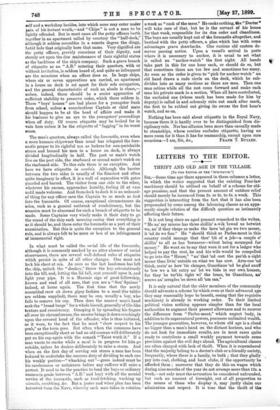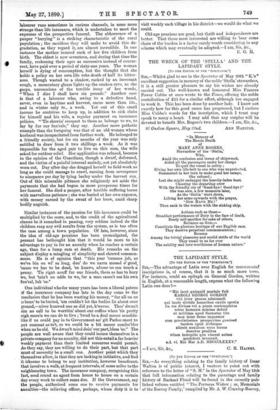LETTERS TO THE EDITOR.
THRIFT AND OLD AGE IN THE VILLAGE.
[To THE EDITOR OP THE "SPECTATOR."] SIR,—Some time ago there appeared in these columns a letter, in which the wiiter suggested that the existing Poor-law machinery should be utilised on behalf of a scheme for old- age pensions, and that the present amount of outdoor relief should merely be increased from 2s. or 3s. to 5s. a week. This suggestion is interesting from the fact that it has also been propounded by some among the labouring classes as an appa- rently simple solution of the difficult question so intimately affecting their future.
It is not long since an aged peasant remarked to the writer, "Me an' my missus has three shillin' a-wik 'lowed us betwixt we, an' if they chaps as meks the laws 'ud gin we two mooer, it 'ud do we fine." He "should think as Parlee-ment in this country could manage that thee bit of a job—a couple o' shillin' to all as has lowances—wrout being scrumped fur money." He went on to say that were it not for a lodger who helped to pay the rent, he and his wife would be compelled to go into the "House," "an' that 'ud cost the par'sh a sight mooer than livin' outside on what we has now. Arra-one 'ud think, seem' as how cheaper, Guardians 'ud be glad anuff to 'low we a bit extry an' let we bide in our own housen, fur they be ter'ble tight wi' the brass, be Guardians, an' screws an' scruples 'ee down all 'um can."
It is only natural that the older members of the community should advocate a scheme by which even at their advanced age they may reasonably hope to benefit, seeing that the requisite machinery is already in working order. To their limited political vision nothing appears simpler than for the local authorities to augment their present allowance and to recover the difference from " Parlee-ment," which august body, in addition to its supernatural powers, possesses unlimited wealth. The younger generation, however, to whom old age is a cloud no bigger than a man's hand on the distant horizon, and who do not look for immediate results, are in most cases quite ready to contribute a small weekly payment towards some provision against the evil days ahead. The agricultural classes are often charged with lack of thrift. When it is remembered that the majority belong to a doctor's club or a friendly society, frequently, where there is a family, to both ; that they gladly pay into coal, clothing, and boot clubs, if the opportunity be afforded them ; moreover that they do this on wages which. during nine months of the year do not average more than 12s. a week,—not only must the accusation be considered unfounded, but such an amount of foresight, out of all proportion to the means of those who display it, may justly claim our admiration and respect. It is true that the thrift of the labourer runs sometimes in curious channels, in none more strange than life insurance, which is undertaken to meet the expenses of the prospective funeral. The abhorrence of a pauper " burying " is a striking characteristic of the rural population ; the sacrifices they will make to avoid this de- gradation, as they regard it, are almost incredible. In one instance the mother insured each of her five children from birth. The eldest is now seventeen, and during that time the family, reckoning their ages as successive instead of concur- rent, have paid over a period of sixty-one years. The woman herself is dying of consumption, but the thought that she holds a policy on her own life robs death of half its bitter- ness. Though wasted to a shadow, racked by an incessant cough, a momentary gleam lights up the sunken eyes, as she gasps, unconscious of the terrible irony of her words, "When I dies I shall have six pounds." Another case is that of a labourer who, owing to a defective hand, never, even in haytime and harvest, earns more than 12s., and in winter only 9s., a week. Yet out of this small income he contrives to keep up, in addition to sick clubs for himself and his wife, a regular payment on insurance policies. " 'Tis showin' reespect to them as belongs to we, to lay by fur our fun'rals," they say. Another more pathetic example than the foregoing was that of an old woman whose husband was incapacitated from further work. He belonged to a friendly society, but for six months of the year was only entitled to draw from it two shillings a week. As it was impossible for the aged pair to live on this sum, the wife asked for outdoor relief. Her application was refused, because in the opinion of the Guardians, though a dwarf, deformed, and the victim of a painful internal malady, not yet absolutely worn out. Day after day she dragged herself to field-work as long as she could manage to crawl, earning from sevenpence to ninepence per day by tying barley under the harvest sun. Out of this miserable pittance she religiously set aside the payments that she had begun in more prosperous times for her funeral. She died a pauper, after terrible suffering borne with marvellous patience ; she was buried at her own expense, with money earned by the sweat of her brow, amid sharp bodily anguish.
Similar instances of the passion for life insurance could be multiplied by the score, and, to the credit of the agricultural classes be it remarked in passing, very seldom indeed do the children reap any evil results from the system, as is too often the case among a town population. Of late, however, since the idea of old-age pensions has been promulgated, the peasant has bethought him that it would be more to his advantage to pay in for an annuity when he reaches a certain age, than for a lump sum at death. His remarks on the subject display a mingling of simplicity and shrewd common- sense. He is of opinion that "this year 'surance job, as we've bin on wi' sa long, don' do we narra mossel o' good, 'cause we has to be dead, 'ee knaws, afooer us can touch a penny. 'Tis right anuff fur our friends, them as has to bury we, but 'tain't no odds to we, for a man cassn't see his own fun'ral, ink 'ee."
One individual who for many years has been a liberal patron 3f the insurance company has late in the day come to the !onclusion that he has been wasting his money, "fur all on us is boun' to be buried, 'um couldn't let the bodies lie about over rround,—niver knawed one as did yet, h'wever. Ther' dwun't 3im no call to be worritin' about our coffins when 'tis pretty nigh more'n we can do to live ; 'twud be a deal mooer sensible- like if us could pay in to Government an' git Parlee-ment to put summat as to't, so we could be a bit mooer comferibler when us be old. We dwun't mind doin' our part, bless 'ee." The people are well aware that they could insure themselves in a private company for an annuity, did not this entail a far heavier weekly payment than their limited resources would permit. As they say, they are willing to do their part, but that part must of necessity be a small one. Another point which they themselves allow, is that they are lacking in initiative, and find it irksome to belong to any institution, however beneficent, that involves a walk, at frequent intervals, of some miles to the neighbouring town. The insurance company, recognising this fact, send round an agent from house to house on a certain day every week to collect sums due. If the Government, say the people, authorised some one to receive payments for annuities—the relieving officer, perhaps, whose duty it is to visit weekly each village in his district—we would do what we could.
Old-age pensions are good, but thrift and independence are better. That those most interested are willing to bear some share of the burden is a factor surely worth considering in any scheme which may eventually be adopted.—I am, Sir, ittc., E.G. H.







































 Previous page
Previous page